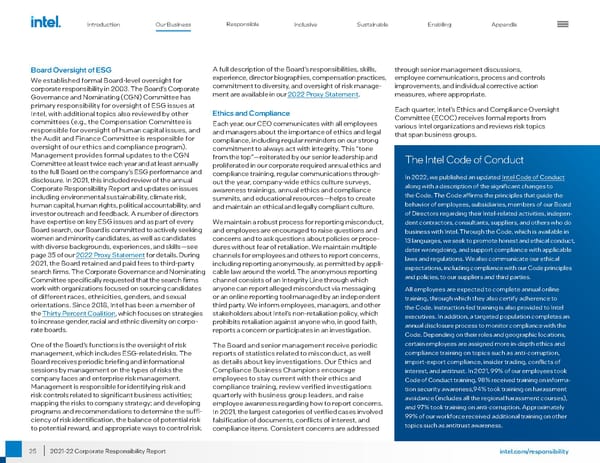25 intel.com/responsibility 2021-22 Corporate Responsibility Report Board Oversight of ESG We established formal Board-level oversight for corporate responsibility in 2003. The Board’s Corporate Governance and Nominating (CGN) Committee has primary responsibility for oversight of ESG issues at Intel, with additional topics also reviewed by other committees (e.g., the Compensation Committee is responsible for oversight of human capital issues, and the Audit and Finance Committee is responsible for oversight of our ethics and compliance program). Management provides formal updates to the CGN Committee at least twice each year and at least annually to the full Board on the company’s ESG performance and disclosure. In 2021, this included review of the annual Corporate Responsibility Report and updates on issues including environmental sustainability, climate risk, human capital, human rights, political accountability, and investor outreach and feedback. A number of directors have expertise on key ESG issues and as part of every Board search, our Board is committed to actively seeking women and minority candidates, as well as candidates with diverse backgrounds, experiences, and skills—see page 35 of our 2022 Proxy Statement for details. During 2021, the Board retained and paid fees to third-party search firms. The Corporate Governance and Nominating Committee specifically requested that the search firms work with organizations focused on sourcing candidates of different races, ethnicities, genders, and sexual orientations. Since 2018, Intel has been a member of the Thirty Percent Coalition , which focuses on strategies to increase gender, racial and ethnic diversity on corpo - rate boards. One of the Board’s functions is the oversight of risk management, which includes ESG-related risks. The Board receives periodic briefing and informational sessions by management on the types of risks the company faces and enterprise risk management. Management is responsible for identifying risk and risk controls related to significant business activities; mapping the risks to company strategy; and developing programs and recommendations to determine the suffi - ciency of risk identification, the balance of potential risk to potential reward, and appropriate ways to control risk. A full description of the Board’s responsibilities, skills, experience, director biographies, compensation practices, commitment to diversity, and oversight of risk manage - ment are available in our 2022 Proxy Statement . Ethics and Compliance Each year, our CEO communicates with all employees and managers about the importance of ethics and legal compliance, including regular reminders on our strong commitment to always act with integrity. This “tone from the top”—reiterated by our senior leadership and proliferated in our corporate required annual ethics and compliance training, regular communications through - out the year, company-wide ethics culture surveys, awareness trainings, annual ethics and compliance summits, and educational resources—helps to create and maintain an ethical and legally compliant culture. We maintain a robust process for reporting misconduct, and employees are encouraged to raise questions and concerns and to ask questions about policies or proce - dures without fear of retaliation. We maintain multiple channels for employees and others to report concerns, including reporting anonymously, as permitted by appli - cable law around the world. The anonymous reporting channel consists of an Integrity Line through which anyone can report alleged misconduct via messaging or an online reporting tool managed by an independent third party. We inform employees, managers, and other stakeholders about Intel’s non-retaliation policy, which prohibits retaliation against anyone who, in good faith, reports a concern or participates in an investigation. The Board and senior management receive periodic reports of statistics related to misconduct, as well as details about key investigations. Our Ethics and Compliance Business Champions encourage employees to stay current with their ethics and compliance training, review verified investigations quarterly with business group leaders, and raise employee awareness regarding how to report concerns. In 2021, the largest categories of verified cases involved falsification of documents, conflicts of interest, and compliance items. Consistent concerns are addressed through senior management discussions, employee communications, process and controls improvements, and individual corrective action measures, where appropriate. Each quarter, Intel’s Ethics and Compliance Oversight Committee (ECOC) receives formal reports from various Intel organizations and reviews risk topics that span business groups. The Intel Code of Conduct In 2022, we published an updated Intel Code of Conduct along with a description of the significant changes to the Code. The Code affirms the principles that guide the behavior of employees, subsidiaries, members of our Board of Directors regarding their Intel-related activities, indepen - dent contractors, consultants, suppliers, and others who do business with Intel. Through the Code, which is available in 13 languages, we seek to promote honest and ethical conduct, deter wrongdoing, and support compliance with applicable laws and regulations. We also communicate our ethical expectations, including compliance with our Code principles and policies, to our suppliers and third parties. All employees are expected to complete annual online training, through which they also certify adherence to the Code. Instruction-led training is also provided to Intel executives. In addition, a targeted population completes an annual disclosure process to monitor compliance with the Code. Depending on their roles and geographic locations, certain employees are assigned more in-depth ethics and compliance training on topics such as anti-corruption, import-export compliance, insider trading, conflicts of interest, and antitrust. In 2021, 99% of our employees took Code of Conduct training, 98% received training on informa - tion security awareness,94% took training on harassment avoidance (includes all the regional harassment courses), and 97% took training on anti-corruption. Approximately 99% of our workforce received additional training on other topics such as antitrust awareness. Introduction Responsible Inclusive Sustainable Enabling Appendix Our Business
 Intel Corporate Responsibility Report Page 24 Page 26
Intel Corporate Responsibility Report Page 24 Page 26